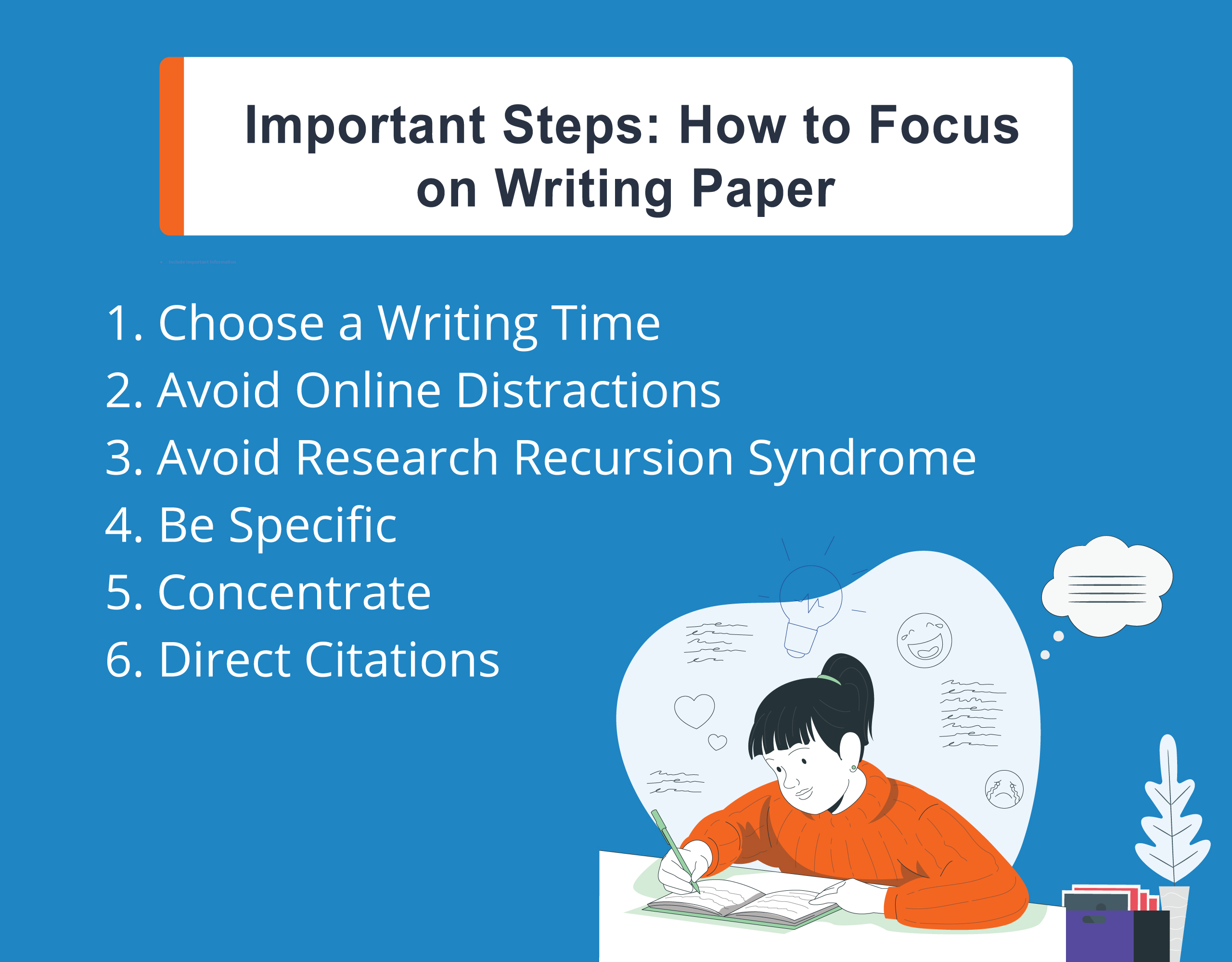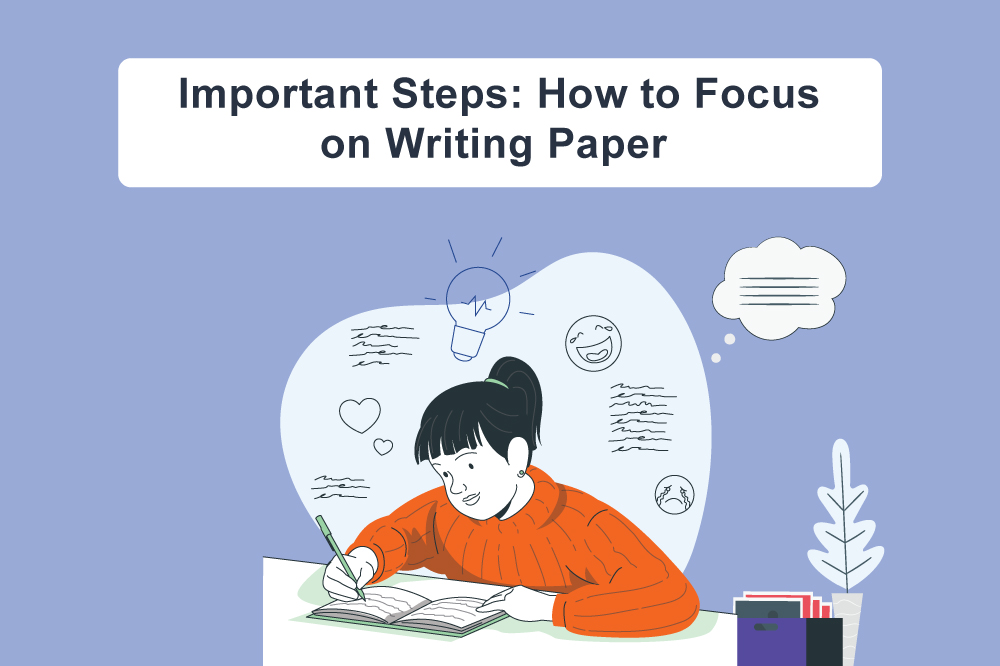Lack of focus is one of the most prevalent challenges students have when writing papers. Nothing is more unpleasant than inattentiveness during a school exam, and it might be difficult to write a paper when you are already behind and under pressure. Before beginning school or college-level academic writing, you must discover a way to focus on the topic at hand. The following recommendations help any student concentrate in order to write an excellent paper.
Why Do We Lose Our Focus?
Evolution has created our minds to lose focus as a survival tactic, whether we like it or not. After analyzing whatever we have paid attention to, our brain selects objects that are either dangerous or desirable.
When we were hunter-gatherers and observed a dangerous animal, we focused our attention on it. When anything edible grew in the forest, our attention was drawn to it. In the present world, when we attempt to produce a school paper, our brains still desire to do their job. Instead of concentrating on wild animals, they focus on social networking sites, Facebook, and anything else deemed desirable. As a result, we pay a high price: We require anything between 5 and 15 minutes to recover our concentration. For extended periods of hard labor, diversions are toxic.
Not every disruption is external. In fact, the reverse is true. Approximately 40% of all diversions are due to internal thought processes. We may become engulfed in a sea of thoughts that consumes our whole focus, causing us to lose sight of what we need to be doing. This emphasizes the need to find techniques to concentrate on writing the essay since doing so helps to organize our thoughts. And to verify that our papers are written appropriately!
Ways to Focus While Writing Your Paper

Research papers writing is an essential writing skill for all students, whether they are writing college essays or elementary school essays. Diverse elements influence our capacity for concentration.
The most important thing is not to determine what you want to say at the last minute. While writing a paper, you should have a clear idea of what you want to say, how you want to express it, and how you will support your case.
If you use a plan when writing your paper, you will experience writer’s block far less frequently. You will also be able to communicate your ideas with more clarity and engage in superior writing strategies, which will be beneficial whether you are writing an essay or a research paper.
1.    Choose a Writing Time
Mornings should be designated as writing time. If you cannot secure the full morning, one or two hours will be sufficient. Even if you consider yourself a “night owl,” you should give this a try: in the morning, our thoughts are clear, and our capacity to concentrate is at its height. This takes us to our second point: Do not go online until your morning writing session is over. Avoid visiting any news or social media websites in the morning. No blogs, articles, or Instagram discussions with friends will be permitted. Additionally, you should avoid checking your email whenever possible. If necessary, quickly skim your email to determine if there are any urgent situations, but do not interact with the messages until absolutely necessary. It will be easier to resist the want to update and divert yourself in the morning if you refrain from using your computer and phone in the last hour or two before bed. Read a book, listen to a podcast, converse with your partner, play a game with your roommates, conduct some calming (yoga) activities, write in a notebook, etc.
2.    Avoid Online Distractions
By avoiding online distractions late at night and early in the morning, you may cleanse your mind throughout the night and start the day with a focused mind that is not avoiding difficult work. In addition, avoiding blue screen light in the evening enables a restful night’s sleep, allowing you to confront challenging tasks, such as writing your thesis, well-rested and refreshed.
3.    Recognize the Process of Writing
It will help you comprehend the complete process of writing a research paper.
The steps are as follows:
- Examine current arguments and relevant background information important to the paper prompt.
- Create your own arguments and views regarding the article’s subject. The primary topic belongs in the thesis statement and typically appears at the start of the work.
- Prepare an outline of your major ideas, including citations and references, to guide your writing.
- Be as clear as possible in your paper, from the beginning of your paper through its finish.
- Revision is the process of reviewing and revising one’s work to ensure that each body paragraph flows smoothly and advances the main thesis.
Those who have ever composed a paper can likely recite these stages by heart. However, memorization of the method needs to be improved.
4.    Avoid Research Recursion Syndrome
When you don’t complete and focus on the research process, you begin seeking sources, which is time-consuming and detrimental to the rest of the research-writing process.
Clarify how much research is genuinely required for the various points you make in your writing in order to avoid being mired in endless research cycles.
You could need two or more citations for significant concerns but only one for minor ones.
Start with a wide research strategy: Find a broad, readable source on the topic, utilize an AI summary tool to obtain an overview, and then search the bibliography for interesting specialized sources to analyze.
You may utilize the Internet to your advantage, but you should avoid discussing it until absolutely necessary. Referencing referenced and peer-reviewed scholarly books and papers are often preferred in academic works. You may utilize Google Scholar to locate these sources.
5.    Be Specific about the Topic of Your Paper
Nothing undermines your efforts to concentrating more than producing a mountain of facts to realize that you did not address the essential question.
The first step in writing a paper is to grasp the issue or topic completely. What is its significance? Which strategy is optimal for solving the question? Do you have any first ideas for how to bring the topic to life? Before beginning research, planning, and writing, evaluate the preceding principles and list them in bullet points.
For a complex statement, it may be helpful to break it down into sub-statements and then graphically represent them, such as with a drawing, mind map, Venn diagram, or doodle. The important is that you used an active technique to deconstruct the statement and comprehend how each component relates to the others. This is a particular sort of theme analysis.
Additionally, it is essential to remain focused on the topic when researching and writing.
It is astonishing how quickly you can lose sight of the issue if it is not at the forefront of your mind when writing.
6.    Use Paper Structure to Help Concentrate
In academic papers, it is helpful to demonstrate your understanding of both sides of an issue by evaluating ideas from both perspectives. However, you typically take a position and support it with facts and arguments.
You will do better overall and be able to concentrate better if your paper is properly organized and has a clear argument. This is where a clear and comprehensive strategy, as well as mind mapping, might be useful.
7.    Include Direct Citations To Sources In Your Plan.
Make it simple to rearrange blocks to obtain a better overall line across your text. A good outline can also help you maintain the optimum length and focus for your papers: Know how many words are required for each segment so that you write appropriately in one section and insufficiently in another. This will result in a well-balanced document that addresses all relevant points.
Consider quotations and citations as building blocks you may use to construct your piece; store a source and utilize it when it makes sense. If you discover a superior quotation, feel free to replace it.
8.    Go With the Flow
When authors concentrate intensely, they are aware of it. At this phase, writing is performed with such ease that it looks natural. This is referred to recognize by psychologists as the flow state. At this stage, the author is considered to be in the zone.
Time does not exist when a writer is entirely immersed in his work. The writer enjoys how effortlessly he composes his papers. It is essential that you optimize it immediately.
When this flow is interrupted, it may not be restored immediately. Not even consider altering your work. It may occur later.
To improve your flow condition, you must eliminate any disruptions. It is the same as making the time you desire to dedicate to work sacred. Make sure everything is on the table. Your gadgets may require storage while they are not in use.
9.    Do Not Multitask
There will always be an endless list of tasks to complete. These items are all fighting for your attention. We have repeatedly given in to the temptation of multitasking.
No matter how attractive it seems, it is not beneficial. Concentration is necessary for crucial mental tasks such as writing your study report. Your research paper’s structure may be altered due to a lack of attention.
10. Escape Your Comfort Zone
Have you ever intended to do your research paper but ended up in bed instead? What if a loved one or family member repeatedly calls? Leaving one’s comfort zone is typically a prudent choice.
Your comfort zone may be the biggest source of distraction for you. Move to a location where you can focus. You may also experiment with different methods, such as using a pencil or typing on a laptop.
11. You Only Have Time for the Important Things
Every day comes a fresh set of responsibilities. You will be unable to do whatever you wish. You have just enough time to do the essential task, which is your paper.
12. Reserve Time Exclusively For Your Study Report.
Because your research paper will necessitate multitasking, choose a time when you are cognitively alert. The quality and structure of your work would be affected by mental fatigue. You can work on your research piece early in the morning. This age is regarded to be highly profitable due to your youth. In the early hours of the morning, before the heat of our daily interactions begins to weigh on us, our mental condition is often at its peak.
The Bottom Line
All of these ways are helpful for focus while writing your research papers or essays. Some may work more effectively than others, while others may not work at all; each author must discover their own best practices. However, it never hurts to try, particularly if your lack of attention has been a source of frustration. However, once you learn the proper techniques, you’ll wonder how you ever managed to write without them.
Frequently Asked Questions- FAQs
- How should I choose a topic for my research paper?
If the topic is not defined, you should make an effort to choose one that is both wide enough to allow you to offer sufficient evidence and limited enough to ensure that you cover all the necessary ground. If at all feasible, go with a subject that piques your own personal interest; doing so will make your work much simpler.
- How do I properly cite sources in a research paper?
Because the structure of citations varies based on the style, it is important to check the guidelines for the assignment. The Modern Language Association (MLA) or the American Psychological Association (APA) format is used for the majority of educational research initiatives.





